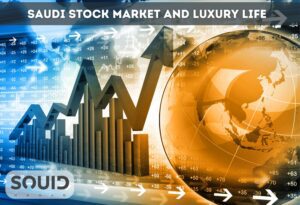Saudi Stock Market And Luxury Life
If you seek luxury life, no doubt that the Saudi stock market is your way to big business and deals. Saudi stocks dominate investment in the whole gulf Cooperation Council even after the era of falling oil prices.
You don’t have to be a billionaire to invest in the Saudi stock market, you can invest through funds that focus on Middle Eastern companies through any of a handful of exchange-traded funds(ETFs), like SPDR S&P Emerging Middle East, Africa ETF (GAF) and the WisdomTree Middle East Dividend Fund (GULF).
As a beginner, Can you invest in the Saudi stock market?

Saudi Stock Market And Luxury Life
Yes, you can, Within the framework of the sensual efforts and endeavours of the Saudi government to support investment and trading in the Saudi stock market and the desire to increase the number of investments in the Saudi market stock, especially for emerging sectors, which include clean energy, tourism, mining, education, entertainment, infrastructure, health, and logistics, the entrepreneurial ecosystem has become so strong that it welcomes 100% foregin_owned businesses since the Saudi stock market opens its door in mid-2015, and offered a lot of options.
According to the Heritage Foundation, the process of starting a business requires no minimum limit of capital, which streamlined the whole process. considering the Saudi stock market, as one of the most liquid markets in the Middle East and North Africa, offers investors a high ability for growing their capitals through a lot of fasciitis that the Saudi governorate offers, and the huge variety in trading in different securities such as Bonds and Sukuk, REITs, ETFs, CEF and of course stocks.
Can foreigners enter the Saudi stock market (money market)?
The motto of the Kingdom of Saudi Arabia will always and ever remain “we are always open to business” Saudi Arabia is also known for ranking 41st on the Global Foreign Direct Investment Country Attractiveness Index; Most foreign investors approach the Ministry of Commerce and Investment as a starting point for assistance but before making any investment decisions, you should be aware of the risks and returns of investing in securities of different types.
Small and medium-sized enterprises account for nearly a fifth of the national GDP, and the government wants this figure to be 35% by the vision of 2030, and you can be part of this plan by trading in the Saudi stock market as it represents a good opportunity to start your own business.
Maybe Investing in the Saudi stock market is a little bit different from what you are used to in your country but also same basics are obliged and there are some factors that you need to consider before trading in the Saudi stock market.
- What opportunities are available as a foreigner or resident ex-pat?
- Are the regulations around foreign investment set to change?
- Is foreign investment sufficiently protected by law?
- How does the geopolitical environment impact the market?
- Is the country politically stable?
- Is the currency stable?
- How developed is the banking and financial system?
The field of investment in the capital market
Before getting into the details of the investment, first, you need to know the difference between smart saving and investment; saving is often deposited into a bank savings account or a fixed deposit, While investing involves buying assets with the aim of helping to make them grow and increase in value but also you need that this benefit comes with its risk, this assets may be gold, stocks, or shares, real estate.
Sukuk and bonds
Islamic principles discourage debt in general; as the interest on depot is considered usury and exploitative of the debtor here comes the concept of Sukuk
- Sukuk: Sukuk is well known and used in the Saudi stock market. They are Sharia-compliant financial certificates through which investors can gain partial ownership of the issuer’s assets until the maturity date of it.
- Bonds: a financial certificate where investors lend money to the issuers with an obligatory repayment date with interests.
Real Estate Investment Trusts (REITs)?
Real estate investment trusts enable you to invest on a large scale in income-producing real estate, such as apartments, self-storage facilities, warehouses, malls and hotels. REITs provide high dividends and long-term capital appreciation. Its total returns long-term tend to be similar to those of value stocks which makes it a good investment with the biggest benefit of the high-yield dividends.
REIT leases spaces and then distributes the rent to the shareholders as a dividend, they pay about 90% of taxable income, they don’t own those spaces but instead, they finance and make their profit from the interest on their investment.
Investment Funds and Mutual Funds
- Investment fund: Also known as a collective investment scheme (CIS) is a financial tool that aims to collect money contributed by a group of investors who invest their money in fixed-income securities.
- Mutual Funds: Funded by shareholders that trade in diversified holdings, It’s consisted of a portfolio of stocks, bonds, or other securities. money market funds, bond funds, stock funds, and target date funds, are four types of mutual funds with different returns, risk and characteristics, with the main benefit of access to a variety of investments than an individual investor couldn’t afford alone.
the biggest distinction between index funds and mutual funds is, Index funds invest in a specific list of securities while active mutual funds invest in a changing list of securities, chosen by the manager.
Types of active investment in the stock market
There are 5 types of asset classes of investment funds in the Saudi stock market and all other money markets, each of which has its own characteristics, befits, and risks. So before starting trading in the Saudi stock market you need to fully understand each of them so you can determine which fits your financial strategy and risk tolerance.
- Value investment: A stock-buying strategy that looks for stocks that have been undervalued or traded for less than their real value.
- Growth Investment: If you are willing to withstand the stock market rollercoaster, so it will be suitable for you in the long term. Overall it’s a stock-buying strategy that looks for entities that are expected to grow compared to their industries or increase their profit potential in the future. Some examples are Netflix inc., Amazon, and Apple.
- Trend investment: one of the strategies followed by certain investors who prefer to invest in industries, markets or stocks that are expected to go viral and boom in the future.
- Income Investment: A stock-buying strategy that focuses on building an investment portfolio structured to generate regular income, with the sole objective of generating a constant stream of income, such as real estate funds, but you have to look for them well before investing and get acquainted with the types of real estate and its returns and the experience of the team and the management system.
- Absolute Return Investment: Absolute return investment, the best and largest type of active investment, buys in all losing and winning stocks, has no rules, its goal is only profit, but it is a great risk and requires extensive experience and full time to work, does not win all trades but wins by 60% so that the profit exceeds the daily losses and ends the day with an unstable profit. This takes us to the second part types of Financial Risk!!….
Types of Financial Risk
Every investment has its own return and risk, Generally, the Financial risk of the stock market has been categorized into two groups:
- Systemic risk: It’s a type of risk that can affect the whole market on a large percentage, it’s also known as the market risk. Such as political risk or macroeconomic risk, interest rate risk, currency risk, systematic risk, liquidity risk, and country risk, and it cannot be easily mitigated through portfolio diversification.
- Unsystematic risk: It’s a type of risk that takes place due to company-specific hazards like, a product recall, change in management, change that could drive down company sales or a new competitor product that is able to affect the market share of the company; its also known as idiosyncratic risk or specific risk. After talking about the stock market risk we need to know more about modern risk management portfolios.
Investing in a loan, Is it risky?
It’s so important for any investor to make sure that the ROI (Return on investment) is high enough and the risk is low, plus you need to make sure that you have access to a stable income source, and its the only case that investing in a loan can make sense, it is still unadvisable for any investor to invest through a loan due to its high risk.
What is a modern risk management portfolio?
After determining the fund’s expected return, then you need to determine the whole return and risk level, after that you can build an efficient frontier to know the risk management portfolio you need. So modern risk management portfolio allows you to assemble an asset portfolio that maximizes expected return for a given level of risk.
Pros and Cons of Investing in the Saudi stock market
Saudi stock market is considered a very attractive investment special when crude oil is on the rise, but no doubt that it’s like any other kind of investment it has its own pros and cons.
The advantages of investing in the Saudi stock market include the:
- significant Capital to Spend: No doubt that the Saudi stock market runs strong account surpluses due to crude oil revenue which gives the kingdom a strong ability to invest and develop economic development programs to stimulate the national economy.
- Privatization: Recently the Saudi governorate has taken a set of measures and actions to private certain industries, like telecom and electronics and thus to open its market furthermore to foreign investment
Risks of investing in the Saudi stock market include:
- Depending on crude oil: The vast majority of the country’s revenue is derived from crude oil and its derivatives, so any downturn in the global crude oil prices will have a negative effect on the other industries and hence, the stock market.
- Limitation: Foreign investors cannot own more than 5% of the shares in any single company. Whether resident or non-resident, also cannot collectively own more than 49% of any company’s shares. Each qualified foreign investor is limited to only 20% of the company’s shares, together with 10% of all claims of all listed companies on the stock exchange.
Conclusion:
After presenting a lot of aspects of the Saudi stock market, we can be sure that it will be an excellent destination for you if you are looking for a good investment with a huge return, but you have to be characterized by some qualities, the most important of which is accurate analysis, ability to make long-term plans and readiness for risk.

